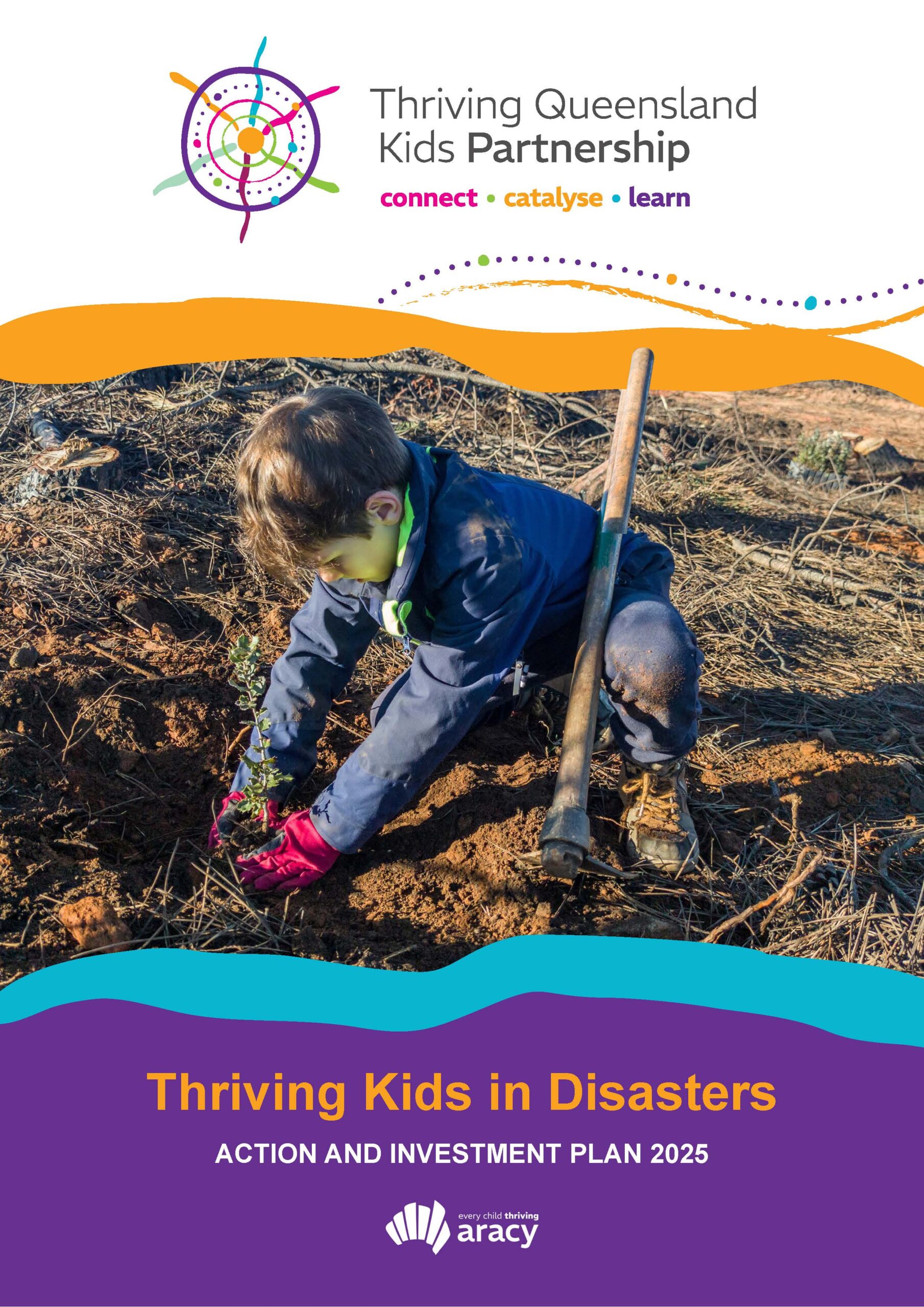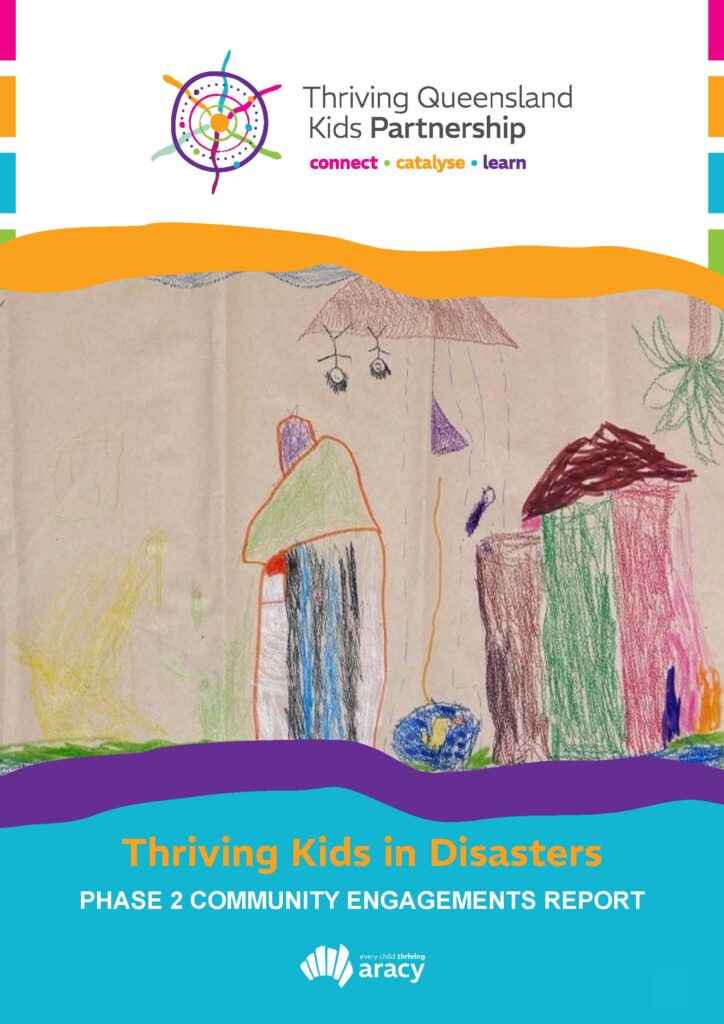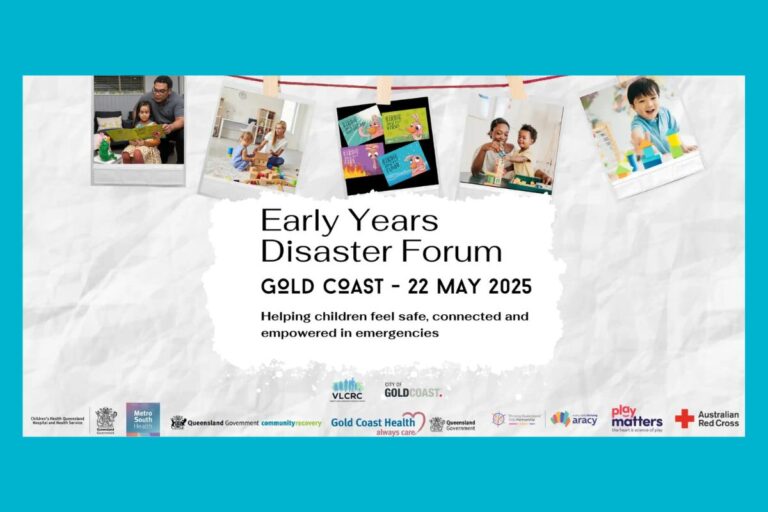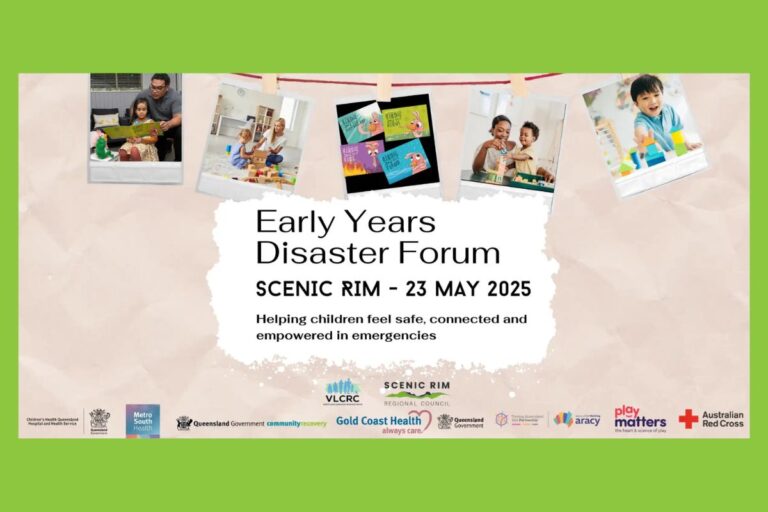What we do / Our initiatives
Thriving Kids in Disasters (TKiD)
Focusing on the needs of infants, children and youth in disasters
As Australia’s most disaster-prone state, Queenslanders are no strangers to the increasingly severe, complex and frequent impacts of adverse weather events.
We know children and young people are disproportionately impacted by – but often invisible in – disaster management settings, despite the best intentions of those involved.
When we consider kids as distinct and unique stakeholders in all aspects of disaster management, we can tap into their agency and enhance their sense of safety and connection, minimising the likelihood of trauma and reducing negative long-term impacts.
This initiative is supporting the health and development of Queensland’s children by … enhancing Queensland’s prevention, preparedness, response and recovery strategies to support child wellbeing and resilience in disasters.
Thriving Kids in Disasters (TKiD) is an initiative of the Thriving Queensland Kids Partnership and The John Villiers Trust (JVT). It brings together stakeholders from a variety of sectors, organisations, and locations with the aim of better gearing our systems to support the needs of infants, children and young people in the face of escalating disaster impacts.
TKiD contributors
Kids and caregivers from Western Downs, Kowanyama and Cairns communities, Queensland
54 Reasons
Act for Kids
Adelaide Hills Council
Australian Breastfeeding Association
Australian National University
Australian Red Cross
Belle Harman
Benevolent Society
Blue Gum TV
Brigalow State School
BUSHkids
Cairns Regional Council
Centacare FNQ
Child, youth mental health services
Chinchilla Community Centre
Community Enterprise Queensland
Community Plus
Country 2 Coast Primary Health Network
CQUniversity
Creative Recovery Network
Department of Education Queensland
Department of Local Government and Water, Fire, Disaster Recovery, and Volunteers
Department of Treaty, Aboriginal and Torres Strait Islander Partnerships, Communities & the Arts
Emerging Minds
Foundation for Rural and Regional Renewal
GIVIT
Hannaford State School
Head to Health Brisbane
Headspace Capalaba, Wesley Mission Australia
Healthy North Coast
Human Nature
Ipswich City Council
Kidsafe
Kogan State School
Kowanyama Aboriginal Shire Council
Kowanyama Anglican Church
Kowanyama State School
Kowanyama, Children’s Health Queensland
Laidley Community Centre
Leadrrr
Lives Lived Well
Local Government Association of Queensland
Lockhart River Aboriginal Shire Council
MacKillop Seasons
Meandarra State School
Mission Australia
Nikki Trigell Consulting
Outback Futures
Pathways to Resilience
Play Matters
Queensland Centre for Perinatal Infant Mental Health
Queensland Department of Education
Queensland Fire and Emergency Service
Queensland Mental Health Commission
Queensland Police Service
Queensland Reconstruction Authority
Queensland Reconstruction Authority – Get Ready Queensland
Queensland University of Technology
RACQ
Rain Barrell Labs
Red Cross Australia
Red Earth Community Foundation
ROBSET Consulting
Royal Far West
Social Futures
Southern Downs Regional Council
Suncorp
The Family Centre
The John Villiers Trust
Toowoomba Regional Council
UNICEF Australia
University of Melbourne
University of Queensland
University of Sunshine Coast
University of Western Sydney
Wesley Mission Queensland (headspace Capalaba)
Western Downs Regional Council
Yarra Ranges Council
Yeronga Community Centre
yourtown
Youth Empowered Towards Independence (YETI)
“The needs of young Queenslanders are always diverse, unique and complex, and this is no less true in the face of disasters. But fulfilling them is a challenge which can be met, with the right focus and the will to act. A concerted effort is required across all levels of Queensland society, and crucially, from the decision-makers at the top. Young Queenslanders rely on our state’s leadership to act, by seizing opportunities like those presented in this report and pursuing them with real commitment, recognising their necessity.”
Ryan Salle, Youth Participant, QFCC Youth Summit
Risk of disasters for Queensland children
- Of all Australian states and territories, Queensland is the most prone to disasters, having experienced 100+ significant events since 2011.
- Kids in rural and regional areas are up to eight times more likely to experience a natural disaster than their city counterparts. In remote areas it is up to 16 times.
- 100% of Queensland’s Local Government Areas have been activated under the Disaster Recovery Funding Arrangements since 2021, with 1.6 million children and young people impacted.
- According to UNICEF, worldwide, kids are recognised as the population group most at risk during disasters.
Reports
DOWNLOAD
Thriving Kids in Disasters Report
The first comprehensive review of how the wellbeing of children is included in disaster management in Queensland. Compiled in collaboration with 40+ organisations and offering 38 recommendations.

PDF 1.5MB

DOWNLOAD
Thriving Kids in Disasters SUMMARY Report
A condensed 16-page version of the Thriving Kids in Disasters report, providing a summary of the outcomes and recommendations.

PDF 1.5MB

DOWNLOAD
Thriving Kids in Disasters Action and Investment Plan
The TKiD Action and Investment Plan has been thoughtfully co-designed with a range of partners and contributors, as a resource for funders, decision-makers, communities and organisations to enact impactful solutions for disaster readiness, recovery and resilience building.
It presents strategies and opportunities for investment and collaboration that explicitly encompass the social, physical, mental and cultural wellbeing of kids, families and communities within the broader context of disaster risk reduction.

PDF 1.5MB

DOWNLOAD
TKiD Phase 2 Community Engagements Report
A valuable resource for community leaders, policy makers, service providers, government and others seeking to make our disaster planning and decision making processes more inclusive of young voices and ideas.
This report shares insights drawn from engagements with kids and caregivers in three regional Queensland communities that have experienced disasters: Western Downs, Kowanyama and Cairns. From these voices, the report identifies common themes to inform further action both locally and more broadly across the state. The report also shares the methodology used in these engagements, highlighting a range of strategies that can help to generate rich, authentic responses when consulting and engaging with kids.

PDF 1.5MB

Project Library
LINK
Thriving Kids in Disasters (TKiD) Project Library
This Project Library contains links to 70+ resources to support individuals and organisations working with infants, children, young people, families, and communities in the context of disasters.


‘It’s heartening to see a growing focus on children’s wellbeing in disaster response and recovery – and the TKiD principles have helped guide our efforts to ensure kids are not just safe, but truly supported to thrive. Thank you to the TKiD team and partners for your leadership in this space …!’
Jaimee Mahony, Head to Health Kids
Webinars
LINK
Thriving Kids in Disasters: Words into Practice (Webinar 1)
Recorded on 20 September 2024, this session focused on supporting children’s and young people’s concerns, capabilities and actions relating to climate change and disasters. Guest speakers are Canice Curtis from Wesley Mission Queensland and Briony Towers from Leadrrr.


LINK
Thriving Kids in Disasters: Words into Practice (Webinar 2)
Recorded on 23 October 2024, this session focused on supporting the social and emotional wellbeing of children and their caregivers in disasters. Guest speakers are Dr Sharleen Keleher from the Queensland Centre for Perinatal and Infant Mental Health and Brad Morgan, Director of Emerging Minds.


LINK
Thriving Kids in Disasters: Words into Practice (Webinar 3)
Recorded on 27 November 2024, this session provided an overview of the NSW Resilient Kids project as an example of how we can design and deliver collaborative child- and youth-focused recovery programs. Guest speakers are from the Resilient Kids long-term flood recovery initiative in Northern NSW: Sophie Boyle (HNC), Kat Fermanis (The Family Centre), Shoshanna Oks (Social Futures), Jen Parke (Human Nature), Jody Wilcox (LLW).


LINK
Early Years Disaster Forum - Gold Coast
When: Thursday 22nd May 2025 / 9am – 3pm
Where: Varsity Lakes Community Centre, 20 Mattocks Rd Varsity Lakes
Learn about the latest research providing valuable insights into the impact of disasters on early childhood.


LINK
Early Years Disaster Forum - Scenic Rim
When: Friday 23 May / 9am – 3pm
Where: Vonda Youngman Community Centre
2-4 Knoll Rd, Tamborine Mountain
Learn about the latest research providing valuable insights into the impact of disasters on early childhood.


Blogs
Blog: Caring for children and caring for the planet are inextricably linked
Blog: Wellbeing for workers supporting children and families after a disaster
Other links
DOWNLOAD
Thriving Kids in Disasters – Phase 2 Overview
In partnership with key stakeholders, the TKiD project phase 1 provided a systemic review of strengths and improvement opportunities across Queensland’s disaster management and recovery arrangements related to child wellbeing and resilience. Find out how Phase 2 is building on the findings and work towards the implementation of recommendations using co-development and delivery.

PDF 1.5MB

LINK
Supporting infants and children in disasters: A practice guide
Emerging Minds’ practice guide is a series of resources on child-centred and family-focused approaches in disaster preparedness, response and recovery. It aims to equip practitioners with foundational knowledge and evidence-informed approaches to support infants, children and their families during and after disasters, and promote their long-term healing and wellbeing.


LINK
Emerging Minds Climate Change and Disasters Toolkit
When discussing the relationship between climate change and disasters and mental health, it’s essential to rely on factual and clear communication strategies, avoiding potential pitfalls or misconceptions. This toolkit provides suggestions and examples.


‘It’s not everyday that you get the opportunity to work in such a beautifully considered and developed structure, where leadership is provided in the most important ways. The TKiD Leadership Alliance has been invaluable. TKiD coordinates our efforts so that we can all contribute collectively to something that has the ability to take us to the next level. TKiD means our ideas can find a bigger system, a place to sit, a place to stay and a place to grow.’
TKiD Leadership Alliance member, Helen Travers, Youth Empowered Towards Independence (YETI), FNQ
Thank you to our partners
OUR INITIATIVES
WHAT WE DO
Looking for more?
Search the resource library for reports, submission, articles, videos, webinars and more to inspire you and build your knowledge and confidence to create change!
More Initiatives
Pathway Card Heading Will Go Here
Lorem ipsum dolor sit amet, consectetur dim to adipiscing elit. Ut elit tellus, luctus nec amet ullamcorper mattis, pulvinar dapibus leo.
Pathway Card Heading Will Go Here
Lorem ipsum dolor sit amet, consectetur dim to adipiscing elit. Ut elit tellus, luctus nec amet ullamcorper mattis, pulvinar dapibus leo.
Pathway Card Heading Will Go Here
Lorem ipsum dolor sit amet, consectetur dim to adipiscing elit. Ut elit tellus, luctus nec amet ullamcorper mattis, pulvinar dapibus leo.
Pathway Card Heading Will Go Here
Lorem ipsum dolor sit amet, consectetur dim to adipiscing elit. Ut elit tellus, luctus nec amet ullamcorper mattis, pulvinar dapibus leo.
More about our work ...

Explainer video: "What surrounds us shapes us"
This short explainer video introduces the Resilience Scale and ARACY’s The Nest framework as models to help understand how experiences and environments shape children’s health and development.

Partnerships charter
Our Charter clearly sets out the partnership’s shared goals, values and ways of working to improve systems for Queensland’s children. We invite you to review the Charter and join us if you support our shared vision for Queensland kids.

Report: Queensland Place-Based Rivermap
The Queensland Place-Based Rivermap proposes systemic actions to support our many place-based initiatives. Let’s work together to create local conditions that are good for families and kids.